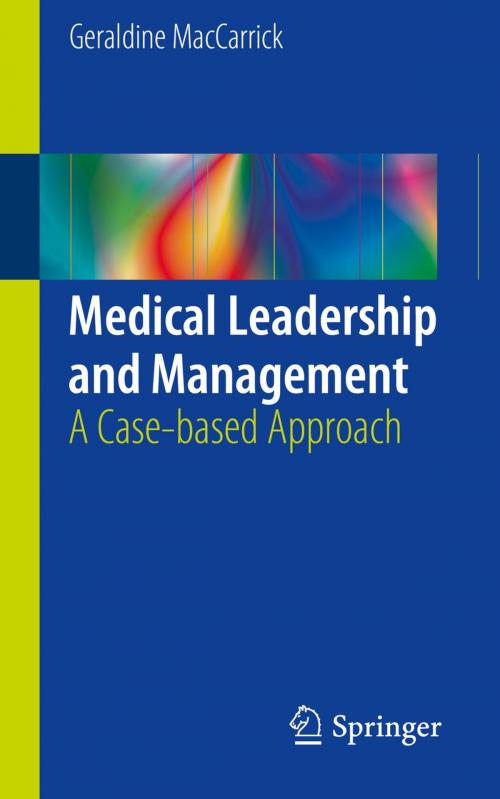Medical Leadership and Management
A Case-based Approach
Nonfiction, Health & Well Being, Medical, Reference, Administration, Reference & Language, Education & Teaching| Author: | Geraldine MacCarrick | ISBN: | 9781447147480 |
| Publisher: | Springer London | Publication: | September 20, 2014 |
| Imprint: | Springer | Language: | English |
| Author: | Geraldine MacCarrick |
| ISBN: | 9781447147480 |
| Publisher: | Springer London |
| Publication: | September 20, 2014 |
| Imprint: | Springer |
| Language: | English |
Leadership and management in the context of healthcare is about improving the quality of medical care delivered at all levels. Doctors frequently lead healthcare teams with responsibility for significant clinical resource which requires management and leadership skills regardless of specialty. A growing body of literature has also argued that medical leadership plays an integral part in the success and effectiveness of organisational change in the health sector. Being an effective medical leader requires a different set of skills from being a good clinician. It is therefore important that future medical graduates are supported and equipped with the high-level skills required for their role (e.g. leading and developing multidisciplinary teams, understanding organizational systems, processes and interdependencies, redesigning services and working collaboratively with a wide range of stakeholders). This growing interest across the globe in preparing medical graduates for the role of medical manager and leader requires a comprehensive approach to education and training which begins at an undergraduate level. As an undergraduate these skills are frequently neglected or not taught well. However, with the correct resources and using a case-based approach the undergraduate program can easily support the development of practical leadership and management skills. The case studies and supporting text will provide an overview of the fundamentals of leadership theory and practice relevant to medical students, junior doctors and specialty trainees. Using internationally recognized competency frameworks this book will support the acquisition of knowledge and skills relevant to medical management and leadership such as project management, intelligent leadership, presentation skills, audit, organizational decision making and engaging relevant stakeholders.
Leadership and management in the context of healthcare is about improving the quality of medical care delivered at all levels. Doctors frequently lead healthcare teams with responsibility for significant clinical resource which requires management and leadership skills regardless of specialty. A growing body of literature has also argued that medical leadership plays an integral part in the success and effectiveness of organisational change in the health sector. Being an effective medical leader requires a different set of skills from being a good clinician. It is therefore important that future medical graduates are supported and equipped with the high-level skills required for their role (e.g. leading and developing multidisciplinary teams, understanding organizational systems, processes and interdependencies, redesigning services and working collaboratively with a wide range of stakeholders). This growing interest across the globe in preparing medical graduates for the role of medical manager and leader requires a comprehensive approach to education and training which begins at an undergraduate level. As an undergraduate these skills are frequently neglected or not taught well. However, with the correct resources and using a case-based approach the undergraduate program can easily support the development of practical leadership and management skills. The case studies and supporting text will provide an overview of the fundamentals of leadership theory and practice relevant to medical students, junior doctors and specialty trainees. Using internationally recognized competency frameworks this book will support the acquisition of knowledge and skills relevant to medical management and leadership such as project management, intelligent leadership, presentation skills, audit, organizational decision making and engaging relevant stakeholders.















